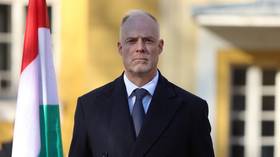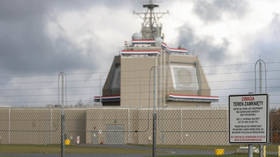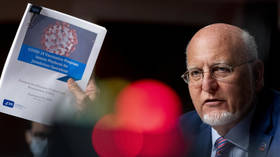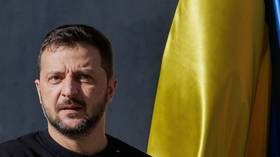Russophrenia - an illness in need of a cure
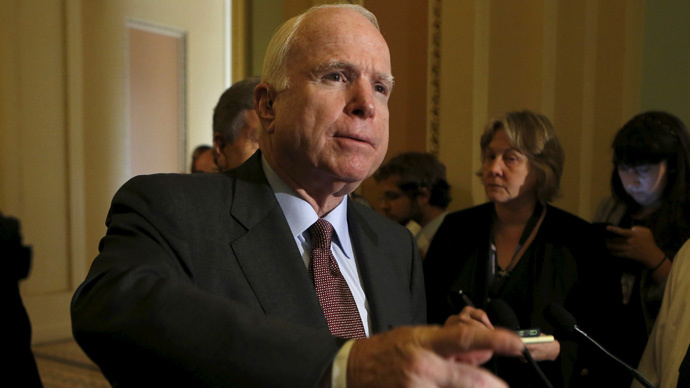
Russophrenia - a condition where the sufferer believes Russia is both about to collapse, and take over the world. Since 2013, instances of this ailment have reached epidemic-like proportions in certain parts of Washington, London and Brussels.
It’s been a grim summer in Ireland so far. The warm sunshine of the previous couple of years is absent, replaced by sticky, humid mist which lends itself to a melancholic air. Hence, thoughts have turned to Russia and memories of balmy June evenings there.
However, when I was actually living in Russia, I got so caught up in the place that I completely forgot how little fellow Westerners know of the country. It frustrated me when I returned to Europe, giddy with enthusiasm for my temporary home, to meet attitudes to Russia that haven’t changed much since the Cold War and the days of "reds in the bed."
The reason for this is rather simple. Due to the vast distances involved, Russia is an expensive and time consuming holiday option. From Western Europe, a quick flight down to a Spanish resort is a hell of a lot easier than an, often logistically difficult, trek to Russia. Hence, the mass media are the gatekeepers of sentiment and this is a privilege they've vigorously abused.
This partly explains why the Russian government was so keen to secure the right to host the 2018 World Cup. FIFA’s flagship event dominates the global news cycle for a full month. What better advertisement for the revitalized nation than a successful tournament?
Berlin's soccer success
The 2006 renewal, which I attended despite Ireland’s disheartening failure to qualify, is frequently cited as having transformed extraneous perceptions of Germany. The hostile stereotype of self-absorbed, arrogant Krauts was exchanged for one of a cool, laid-back bunch of ‘funsters’. However, far more importantly, it seemed to profoundly alter German self-awareness. In a few short weeks, I witnessed a 60-year-old cloud lift from the country.

Many anti-Russia activists are well aware of the fairy dust sprinkled on Germany in 2006. That explains why they are so determined to see Russia stripped of the 2018 installment. These diatribes from The Daily Telegraph’s Rupert Myers and The Interpreter’s Paul Goble are instructive in this regard.
The idea of hundreds of thousands of middle-class soccer fans (predominantly from Europe) mingling with Russians and sojourning in their cities scares anti-Russia activists senseless. For too long they’ve been the sentinels of coverage in the Western media, collectively blocking writers and broadcasters who stray from the consensus. Currently, practically all corporate and state media in Europe and North America is closed to anyone remotely sympathetic to Russia’s position.
Furthermore, most Western correspondents in Moscow are hapless amateurs, selected because they are cheap hires and media outlets just don’t have the resources these days to properly staff foreign bureau. Thoughts of real journalists descending on Russia en masse are enough to keep these greenhorns awake at night. Maintaining the lazy narrative the Moscow hack-pack favors won’t be so easy when capable professionals form their own opinion of the country.
The harbingers of a false doom
Which brings me to this strange condition I call Russophenia. During the years I lived full-time in Russia, from 2010-2013, something frequently confused me. When reading English-language news about the country, there were an inordinate amount of op-eds and news pieces predicting its imminent collapse. As my time of residence coincided with the most financially prosperous years in the nation’s history, this always seemed bizarre.
Here are a few prominent examples from over the years. Anders Aslund, who is still taken seriously as a Russia-analyst by some, predicted the nation would combust back in 1999. Two years later, The Atlantic was drinking the same kool-aid. Julia Ioffe came on board last year with a doom-laden, lengthy tirade. In 2008, this piece by the Guardian’s Luke Harding had Russia “close to economic collapse.” Harding also claimed (in 2007) that Vladimir Putin was the richest man in Europe.
A year after Harding alleged that Russia’s economy was about to croak it, he warned that the Kremlin was launching a “new arms race.”
Russia's ruble as rubble. pic.twitter.com/CORowBYu1p
— Christopher Miller (@ChristopherJM) December 15, 2014
This is classic Russophrenia, believing that Russia is about to threaten the world while on fiscal life-support. Then there’s our old friend Ben Judah, who wrote a whole book predicting the demise of Putin’s Russia, terming it a "fragile empire." However, last year Judah used the pages of the New York Times to warn that the Kremlin was trying to take over Russia's western borderlands. Later, he misrepresented former Polish Foreign Minister Radoslaw Sikorski in a now-infamous Politico interview, suggesting that Putin had offered a Hitler-Stalin style division of Ukraine to Poland. As it happens, Politico has never corrected that erroneous story.
Harding might be an experienced and dexterous operator, but amateur hacks get in on the act too. Here’s Mashable’s Christopher Miller celebrating the ‘downfall’ of the ruble and Russia’s wider economy last December with a, frankly disgraceful, set of tweets.
Nevertheless, a few months later Miller was stricken with Russophrenia as he warned of Russia’s military dominance in Eastern Europe and the vast sums the Kremlin was allegedly spending in Ukraine.
This wintry day just got a bit warmer, watching ruble fall against backdrop of crackling fire. http://t.co/cKmcvZ9EZwpic.twitter.com/rxutxxCDTC
— Christopher Miller (@ChristopherJM) December 11, 2014
However, the most famous victim of Russophenia is America’s raving mad failed Presidential candidate John McCain. When he’s not busy posing with IS fighters, the Arizona senator has a sideline in Russia bashing. Last year, McCain described Russia as a “gas station masquerading as a country." Remarkably, only a few days after his outburst, McCain had compared Putin to Hitler. McCain now occasionally pops up to warn of impending Russian invasions of neighboring lands.
Whenever I mention Russia to an average Dubliner, the usual response is either that Russia is economically devastated or sometimes I get a summary of Kremlin plans to take over Europe. Russophrenia sufferers might have problems with reality, but thanks to a heavily-biased Western media, their influence is both potent and troubling.
The statements, views and opinions expressed in this column are solely those of the author and do not necessarily represent those of RT.
The statements, views and opinions expressed in this column are solely those of the author and do not necessarily represent those of RT.






